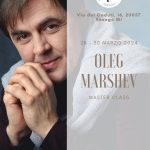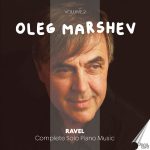RADIO NEW ZEALAND
in Auckland, Concert Chamber, July 1st, 2008 Brahms Sonata n.1
Liszt Apres une lecture du Dante
Chopin 3 Walses op.34, Ballade n.4
Scriabin 2 Mazurkas op.40, 2 Poems op.32, Poeme “Vers la flamme”
A reviewer Sarah Watkin interviewed by Eva Radich
What sort of programme did he choose for his recital?
Well, it was a very, richly Romantic programme – music by Brahms, Liszt, Chopin and Scriabin and, of course, all these composers were virtuoso pianists themselves, so it was a very, richly musical evening. When Chopin waltzes are the light music on a programme you know you are in for a treat.
Interesting putting Chopin and Scriabin together, I would have imagined?
Yes, well, what I heard in the music that sort of linked the two obviously Scriabin’s mazurkas that Oleg played were inspired by those of Chopin but there’s this kind of improvisatory quality to the music and a real, almost jazz-like sense of harmony and freedom of timing and I thought it was a really effective paring in the second half.
The Brahms’ Sonata, I imagine that was the major work on the programme, was it?
Yes, it was, it’s a good thirty minutes worth of music and this is a very – it’s Brahms’ opus 1 Sonata, and a very youthful work. He was all of about nineteen, I think, when he wrote it and very authoritative and bold chords, strong, strong writing and, of course, very virtuosic. It took the audience in its grips, he, Oleg strode out on stage and promptly sat down and immediately burst into these really strong chords. It was almost like we hadn’t had a chance to catch our breath and open the programme books. He really asserted his authority on the music, right from the first note.
I thought it was interesting that he chose Brahms’ Sonata no 1 when he is known for his enthusiasm for less well-known composers. How did he make it his own?
This was the first time that I’ve heard Oleg Marshev play and what really impressed me was the effortlessness with which he played the whole programme and it struck me that this is a player whose primary concern is the music and not virtuosity for virtuosity’s sake. It’s incredibly difficult music, all of it, and yet he just played it with this sense of ease and space and beautifully lyrical playing, rich sonorities. You were aware of every note, every line in the music, every little detail was there. At times, for me, maybe the sound was almost too thick and rich, but that evolved as the programme developed as well and I think it was a product of the music as much as anything. But it was quite staggeringly impressive playing.
It’s an incredible skill, as well as to have all these works at your fingertips, as he clearly does, but to move from one style, from Brahms, through Chopin to Scriabin, how did he manage that transition?
Well, very effectively, I thought. The Liszt, in between the Brahms and the Chopin was, for me, almost the biggest revelation. I have to confess to not being much of a Liszt fan and I was really taken with this performance – just his sheer story-telling ability, just the connection with the real subtleties in the music, especially in the delicate playing. There was a logic and a real sense of clarity to every thing that he did. It transmitted beautifully to the audience, I thought.
What did he choose for his encores?
There was some Chopin – one of the Etudes, the Revolutionary, a Liszt Transcendental Etude, and then a little Prokofiev interlude at the end, which, you know, he has recorded the complete works of Prokofiev, so it was obviously in his blood, and that’s what I really got with the Scriabin as well. It just felt like, the sound of the piano was like something completely different. He just lived this music.
He sounds like, when I talked to him the other day, quite a passionate man. What sort of emotions did he manage to pull you through in this performance?
Well, absolutely everything. When I was taking notes and reflecting on the Liszt, especially, was just real, heart-breaking tenderness, the most gentle playing was just exquisite in its melancholy, just beautiful and yet this thunderous playing as well – the Dante Sonata of Liszt really does capture these images from the Divine Comedy just so effectively and the Scriabin Vers la flamme at the end, towards the flame which was picturing the fiery end of the world – it’s pretty heavy stuff –
Quite apocalyptic?
Very apocalyptic! Scriabin had this idea at the end of his life to create a piece called the Mysterium and it was supposed to be a seven-day-long megawork performed at the foothills in the Himalayas in India and then after that the world would dissolve into bliss – quite heady stuff from the composer. It does just tell you where his mind was at, descriptive quality and shimmering and very full of colour. It was really incredible.
Marshev is embarking on a recital tour of the North Island plus Blenheim. What would you say to people who were thinking of perhaps going to hear him?
I would highly recommend that they do go along. He’s an incredible performer. Purely from the aspect of watching him, he’s as cool as a cucumber, he sits there – I couldn’t see his hands from where I was sitting but it almost looks as if he’s reading a book it looks so simple and there’s no extraneous physical motion – he’s so into the music and that seems to be the essence of what he’s communicating is purely, he’s a vessel for the composer and that’s beautiful to see. We get a lot of histrionics in performance sometimes and there was none of that – it was just pure music so I would definitely recommend that people go along and catch him on this tour.


